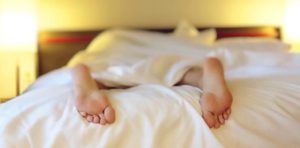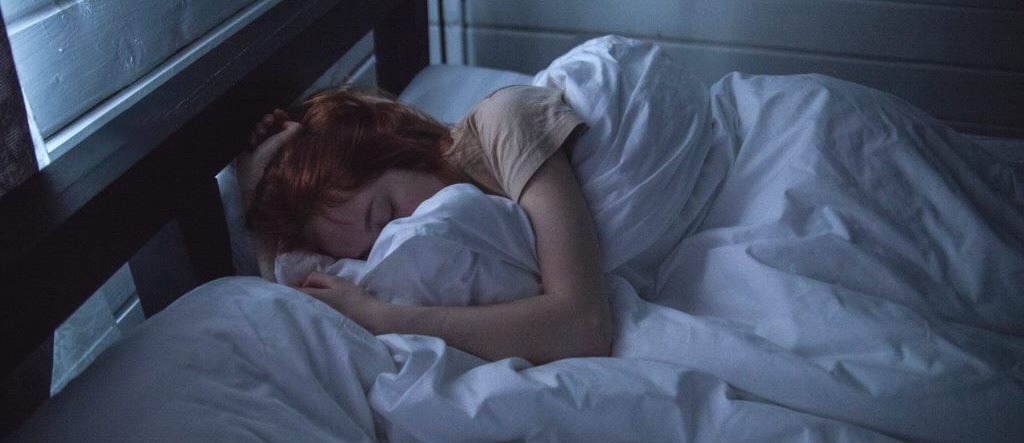We all know that getting healthy isn’t just about eating right and exercising. Getting enough good quality sleep is important.
Personally, I feel like sleep deprivation is torture for me. I don’t know about you, but I’m always researching articles about how to improve your sleep. Some people can handle 4 -5 hours of sleep once in a while, but I can’t. I really need a solid 7 or 8 hours a night to feel right. I’m also the type of person who likes to wake up early, but not to stay up late.
I find that without enough sleep:
- a sniffle turns into a cold
- a cold turns into sick
- annoyed turns into cranky
- tired turns into exhausted
- life just seems much harder
- it’s hard to pay attention the next day
- can’t remember things (like what I’m in the midst of doing)
Why is sleep so important? Whether we realize it or not, there is a lot going on during sleep.
The body relaxes, rebuilds and recovers. The brain goes into different states of sleep, for instance, a slow wave deep sleep or a Rapid Eye Movement sleep. Sleep also helps to wash out wastes in the brain.
The longest time scientifically recorded that anyone ever went without sleep is 11 days. Here is the link to the NPR article and podcast about Randy Gardner and his sleep science experiment. He recommends never trying to go without sleep on purpose like that because he has permanent sleep cycle damage.
Although I’ve never tried anything like that, I know that if I don’t get enough sleep the night before, my body wants more energy. It will send signals to my brain all day that makes me want to overeat to try to get more energy.
One night last winter, I stayed overnight in the hospital, when a family member needed me. I cat napped in the chair next to their bed. By morning, I realized this was a big mistake. I was completely wiped out of reserves, both physically and emotionally. It took me quite a while to get feeling back to regular again.

So how can we improve our sleep? I know for sure that I sleep better if I exercised in the morning. Even though some people find exercise at night to be easier, it’s too much stimulation for me.
Try these 7 ways to improve your sleep and wake up more refreshed
- Quiet the hour before going to bed – Develop a nighttime routine during the last hour you are awake. Don’t do anything too strenuous or difficult — maybe something like take a warm bath, set out your clothes for the morning, and turn down the covers. Try to do things in the same order so that they become automatic. I like to get my bed ready with a rice bag so I’m not too hot, not too cold. I use rice bags at my feet when I go to sleep, but later I wake in the middle of the night to throw the covers off because I’m too warm.
- Go to bed the same time every night – We all know that daylight savings time interferes with sleep. Falling back or springing ahead with the time change always messes up my normal rhythms. Did you read where in the spring, when clocks are moved ahead, a study showed the number of heart attacks increased significantly on the Monday after the time change? Although napping can mess up my sleep cycle, if I know I’m going to be out late and won’t be able to go to bed at my normal time, I find a nap is a good alternative. It’s best if I can catch a nap in early afternoon, but that’s sometimes difficult with my work schedule.
- Set up the bed the way you like it – Arrange the pillows for your head, your body and maybe even your knees before you go to bed. Get the right sheets, blankets and covers that match your personal preferences. Use a mattress that is firm, soft or medium depending on your needs. Wear your favorite pajamas. In the morning, make your bed, so it’s ready to go the next night.
- Wake up at the same time pretty much every day – It will train your body when to expect to get up. If you sleep in on the weekends or get up a whole lot earlier than usual, you need to give yourself extra time to get out of bed and to get ready. A consistent routine has been shown to improve sleep patterns.
- Stop coffee or any caffeine at noon the day before – (I find chocolate affects me too, if I eat it later in the day.) Try not to eat anything a few hours before you go to bed. Drink large glass of water with dinner, but try not to drink too much right before bedtime, so you don’t have to get up in the night. Drinking alcohol is also known to interfere with staying asleep.
- Control the light – Part of sleeping and waking is cued by light for natural circadian rhythms. I think that is one reason why it’s easier for me to sleep on a rainy day or in fall/winter compared to sunny days and spring/summer seasons. Some people find that black out curtains or a sleeping mask helps. I know that the light from screens don’t help, so try not to watch TV or look at your phone right before you go to bed.
- Eliminate extra noise – It’s difficult to sleep in unfamiliar surroundings when there are different noises. Having quite white noise of a fan or very low volume of soothing sounds helps me to stay asleep. A TV playing in the other room or even voices talking outside can interrupt the all important deep sleep or REM sleep. Sometimes ear plugs can do the trick.
What do you do to get to sleep and stay asleep? Leave a comment below or send me an email at Chris@becomingelli.com.
